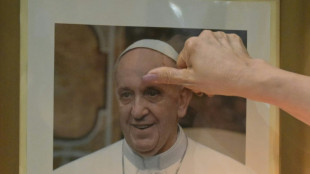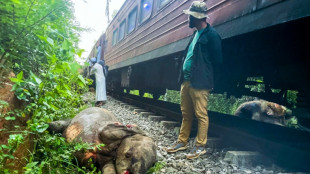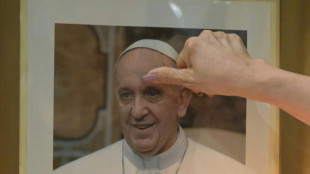
-
 Spotify adds more AI-generated audiobooks
Spotify adds more AI-generated audiobooks
-
Alcaraz dumped out by Lehecka in Qatar Open quarters

-
 Victor Wembanyama to miss rest of NBA regular season: Spurs
Victor Wembanyama to miss rest of NBA regular season: Spurs
-
Scotland coach Townsend eager to extend England run as Russell passed fit

-
 Five things to know about Bond, James Bond
Five things to know about Bond, James Bond
-
Vance savors Trump's 'fun' return to White House

-
 Bavuma wary of Afghanistan challenge in Champions Trophy
Bavuma wary of Afghanistan challenge in Champions Trophy
-
Pope 'sitting up, eating' in seventh day in hospital

-
 'Fixated' man who approached Raducanu is given restraining order
'Fixated' man who approached Raducanu is given restraining order
-
Hong Kong's oldest pro-democracy party prepares to shut down

-
 Andreeva, 17, stuns Swiatek to reach Dubai semi-finals with landmark win
Andreeva, 17, stuns Swiatek to reach Dubai semi-finals with landmark win
-
Mexico says won't accept US 'invasion' in fight against cartels

-
 Burundi forces flee DR Congo as conflict sparks refugee wave
Burundi forces flee DR Congo as conflict sparks refugee wave
-
Stocks in the red as investors worry about growth and inflation

-
 Gill ton powers India to win over Bangladesh in Champions Trophy
Gill ton powers India to win over Bangladesh in Champions Trophy
-
Ireland match no time to experiment, says Wales coach Sherratt

-
 Bomb attacks in Colombia injure six
Bomb attacks in Colombia injure six
-
Netflix says to spend $1 billion producing content in Mexico

-
 Bond franchise shifts to Amazon as Broccoli family steps back
Bond franchise shifts to Amazon as Broccoli family steps back
-
Unfair? Figures belie Trump's claims on EU trade balance

-
 Putin hails Russia's huge number of 'terror' convictions
Putin hails Russia's huge number of 'terror' convictions
-
Israel denounces Hamas as 'monsters' for staging of hostage bodies handover

-
 Rublev downs de Minaur on eighth match point in Qatar
Rublev downs de Minaur on eighth match point in Qatar
-
Teenager kills two women in knife attack at Czech shop

-
 Trump goads '51st state' Canada ahead of hockey grudge match
Trump goads '51st state' Canada ahead of hockey grudge match
-
EU trade chief says tariff reciprocity 'must work for both' bloc and US

-
 Africa's first G20 meeting opens with call for 'cooperation'
Africa's first G20 meeting opens with call for 'cooperation'
-
Luis Rubiales: Spain's disgraced former football federation chief

-
 Stock markets mostly lower on Fed concerns over Trump policies
Stock markets mostly lower on Fed concerns over Trump policies
-
France moves to ban marriage for undocumented migrants

-
 Danish FM says Europe must massively rearm
Danish FM says Europe must massively rearm
-
Spain's ex-football boss Luis Rubiales fined over forced kiss

-
 Scotland star Russell fit to face England in Six Nations
Scotland star Russell fit to face England in Six Nations
-
France's parliament votes to ban some uses of 'forever chemicals'

-
 Anscombe in as Wales ring changes for Ireland in Six Nations
Anscombe in as Wales ring changes for Ireland in Six Nations
-
DR Congo unrest sparks biggest refugee wave to Burundi in 25 years

-
 Milan edges UAE Tour 4th stage as Pogacar retains lead
Milan edges UAE Tour 4th stage as Pogacar retains lead
-
Liverpool boss Slot urges Nunez to improve his 'mindset' after Villa miss

-
 South Korea's ousted PM says he tried to stop martial law decree
South Korea's ousted PM says he tried to stop martial law decree
-
Walmart sales rise but shares tumble on forecast

-
 Spain court convicts ex-football chief for sexual assualt over forced kiss
Spain court convicts ex-football chief for sexual assualt over forced kiss
-
Mercedes-Benz flags cost cuts, tough year ahead after torrid 2024

-
 Towhid hits ton as Bangladesh reach 228 after 35-5 against India
Towhid hits ton as Bangladesh reach 228 after 35-5 against India
-
ECB rate hikes result in record loss in 2024

-
 Romanian director Jude shoots latest film in 10 days on an iPhone
Romanian director Jude shoots latest film in 10 days on an iPhone
-
Sri Lanka passenger train kills six elephants

-
 Pressured by Putin and Trump, walls close in on Zelensky
Pressured by Putin and Trump, walls close in on Zelensky
-
Stock markets mixed on Fed concern over Trump policies

-
 Birkenstock sandals are not art, German court rules
Birkenstock sandals are not art, German court rules
-
Hospitalised Pope had peaceful night, up, eating, working: Vatican


Turkey arrests 282 despite reconciliation bid with PKK
Turkey has detained 282 people in a nationwide swoop on those with suspected "terror" ties, the interior minister said Tuesday, despite a parallel government bid to end the bloody four-decade Kurdish conflict.
Ankara is seeking to revive peace talks with the Kurdistan Workers' Party (PKK), designated as a terror group by Turkey and its Western allies, that have been frozen for a decade.
The process began when a hardline nationalist party unexpectedly offered an olive branch to jailed PKK founder Abdullah Ocalan in October.
The raids began five days ago and have so far taken place in 51 cities including Istanbul, Ankara and the Kurdish-majority city of Diyarbakir in the southeast, Interior Minister Ali Yerlikaya said on X.
On Tuesday, the authorities issued arrest warrants for 60 people, including members of the main pro-Kurdish DEM party, several left-wing figures and journalists. All were detained over alleged terror ties, the Istanbul prosecutor's office said in a statement.
Fifty-two have been detained so far.
Among them were three journalists, the Turkish Journalists Union said.
"It is unacceptable that they were detained during raids on their homes rather than being summoned to the police station" for questioning, it said.
- Keeping the upper hand -
Writing on X, DEM said "Turkey woke up today with another operation" against its members.
"It's clear that the prospect of a solution and peace is beginning to keep some people awake at night," it said.
Sinan Ulgen, an analyst with Carnegie Europe in Ankara, said the government's objective was to start the negotiations with DEM having the upper hand.
"It sends the message that if these negotiations don't succeed, there is always this scenario of greater pressure on the members of DEM," he told AFP.
Since late December, a DEM delegation has twice visited Ocalan and held follow-up talks with Turkey's main parliamentary factions.
On Sunday, the delegation travelled to Iraq to meet Kurdish representatives.
Militants from Ocalan's PKK, which has waged a decades-long insurgency against the Turkish state, operate out of Iraq's Kurdistan region, where Turkey also has military bases.
The delegation will hold more talks with Kurdish officials in the city of Sulaymaniyah on Tuesday, including the autonomous region's deputy prime minister Qubad Talabani.
In October, the hardline nationalist MHP leader Devlet Bahceli urged Ocalan to renounce violence in exchange for a possible early release from Imrali island, where he has been serving life in solitary confinement since 1999.
Backed by President Recep Tayyip Erdogan, the call has renewed hopes of an end to the conflict that claimed tens of thousands of lives.
Ocalan is widely expected to call on for his followers to lay down their arms in the coming weeks with Kurdish politicians confident it will be no later than Newroz, the Kurdish New Year, in March.
- Little faith -
But many in the southeast have little faith the current initiative will work, recalling the tremendous backlash of violence that erupted when the last peace initiative shattered in 2015.
"Elected mayors are removed, there are ongoing police raids and journalists are rounded up," Zeki Celik, who runs a silver workshop, told AFP in Diyarbakir.
"There's been mistrust, so we don't find it credible."
Since last year's local elections, nine DEM mayors have been removed and replaced by government-appointed administrators.
Gonul Tol, head of the Turkish studies programme at the Washington-based Middle East Institute, said Erdogan was following a two-pronged approach.
"On the one hand, he's pursuing these talks with the PKK, but the second track is that he never actually really wholeheartedly owned it," she told AFP.
"Instead, he kept saying that this was an initiative led by Devlet Bahceli," she said.
"And that second track also included 'business as usual' with the Kurds, meaning targeting them, jailing them, appointing mayoral replacements, thus capturing democratically-elected Kurdish municipalities."
D.Schneider--BTB
